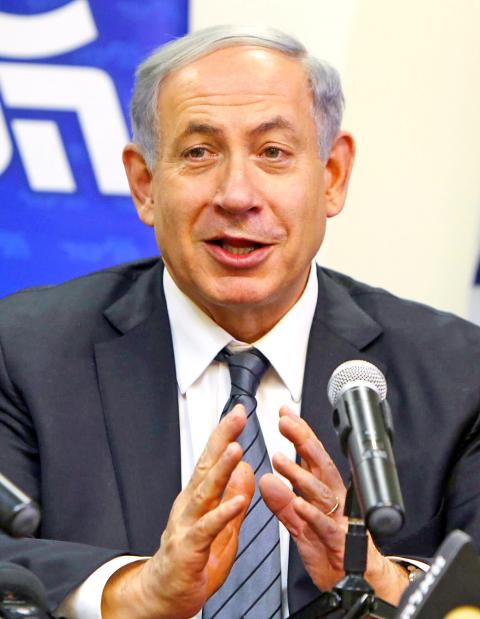Israeli Prime Minister Benjamin Netanyahu held on to his job on Wednesday, announcing that he had hammered together a new coalition government just ahead of a midnight legal deadline, but with a knife-edge majority of just one seat in the 120-member parliament, expectations were that he would have to expand the ruling alliance beyond his natural religious and rightist partners or battle for survival at every vote.
“I am leaving here to call the president and the speaker of the parliament to inform them that I have been able to build a government,” Netanyahu said in remarks at the Knesset after marathon talks with Jewish Home leader Naftali Bennett. “We need to launch it next week and we shall do so.”
Israeli President Reuven Rivlin’s office said he had sent a written note followed up with a telephone call.

Photo: AFP
“I am honored to inform you that I have been successful in forming a government, which I will request is brought before the Knesset for its approval as soon as possible,” Rivlin’s office quoted the note as saying.
“The negotiations are over,” Bennett said on Twitter. “Now we get to work.”
The news came just over an hour ahead of a legal deadline at midnight after which the task of forming a government would have been given to another party leader — most likely Isaac Herzog, head of the center-left Zionist Union, which won 24 seats in the March 17 election, behind 30 for Netanyahu’s right-wing Likud.
The deal with Bennett leaves Netanyahu in command of 61 Knesset votes, bought at the cost of major concessions to his partners.
Analysts say he will be at the mercy of rebels, caprice, or even a bad cold the first time the coalition faces a crucial vote.
He would then be forced to expand the ruling alliance beyond his natural religious and rightist partners, and turn reluctantly to the Zionist Union, which has so far said it will sit in opposition.
“Netanyahu is left with an unmanageable situation,” Tel Aviv University political scientist Emmanuel Navon said.
“The first thing he’ll do tomorrow... is take his phone and start working on a coalition with [the Zionist Union],” he said.
Netanyahu “is a general without soldiers,” the Maariv daily wrote.
Netanyahu himself said he hoped to expand the alliance, without elaborating.
“I have said that 61 is a good number and 61-plus is better still, but it starts at 61,” Netanyahu said.

INVESTIGATION: The case is the latest instance of a DPP figure being implicated in an espionage network accused of allegedly leaking information to Chinese intelligence Democratic Progressive Party (DPP) member Ho Jen-chieh (何仁傑) was detained and held incommunicado yesterday on suspicion of spying for China during his tenure as assistant to then-minister of foreign affairs Joseph Wu (吳釗燮). The Taipei District Prosecutors’ Office said Ho was implicated during its investigation into alleged spying activities by former Presidential Office consultant Wu Shang-yu (吳尚雨). Prosecutors said there is reason to believe Ho breached the National Security Act (國家安全法) by leaking classified Ministry of Foreign Affairs information to Chinese intelligence. Following interrogation, prosecutors petitioned the Taipei District Court to detain Ho, citing concerns over potential collusion or tampering of evidence. The

‘FORM OF PROTEST’: The German Institute Taipei said it was ‘shocked’ to see Nazi symbolism used in connection with political aims as it condemned the incident Sung Chien-liang (宋建樑), who led efforts to recall Democratic Progressive Party (DPP) Legislator Lee Kun-cheng (李坤城), was released on bail of NT$80,000 yesterday amid an outcry over a Nazi armband he wore to questioning the night before. Sung arrived at the New Taipei City District Prosecutors’ Office for questioning in a recall petition forgery case on Tuesday night wearing a red armband bearing a swastika, carrying a copy of Adolf Hitler’s Mein Kampf and giving a Nazi salute. Sung left the building at 1:15am without the armband and apparently covering the book with a coat. This is a serious international scandal and Chinese

Seventy percent of middle and elementary schools now conduct English classes entirely in English, the Ministry of Education said, as it encourages schools nationwide to adopt this practice Minister of Education (MOE) Cheng Ying-yao (鄭英耀) is scheduled to present a report on the government’s bilingual education policy to the Legislative Yuan’s Education and Culture Committee today. The report would outline strategies aimed at expanding access to education, reducing regional disparities and improving talent cultivation. Implementation of bilingual education policies has varied across local governments, occasionally drawing public criticism. For example, some schools have required teachers of non-English subjects to pass English proficiency

NEGOTIATIONS: The US response to the countermeasures and plans Taiwan presented has been positive, including boosting procurement and investment, the president said Taiwan is included in the first group for trade negotiations with the US, President William Lai (賴清德) said yesterday, as he seeks to shield Taiwanese exporters from a 32 percent tariff. In Washington, US Trade Representative Jamieson Greer said in an interview on Fox News on Thursday that he would speak to his Taiwanese and Israeli counterparts yesterday about tariffs after holding a long discussion with the Vietnamese earlier. US President Donald Trump on Wednesday postponed punishing levies on multiple trade partners, including Taiwan, for three months after trillions of US dollars were wiped off global markets. He has maintained a 10 percent